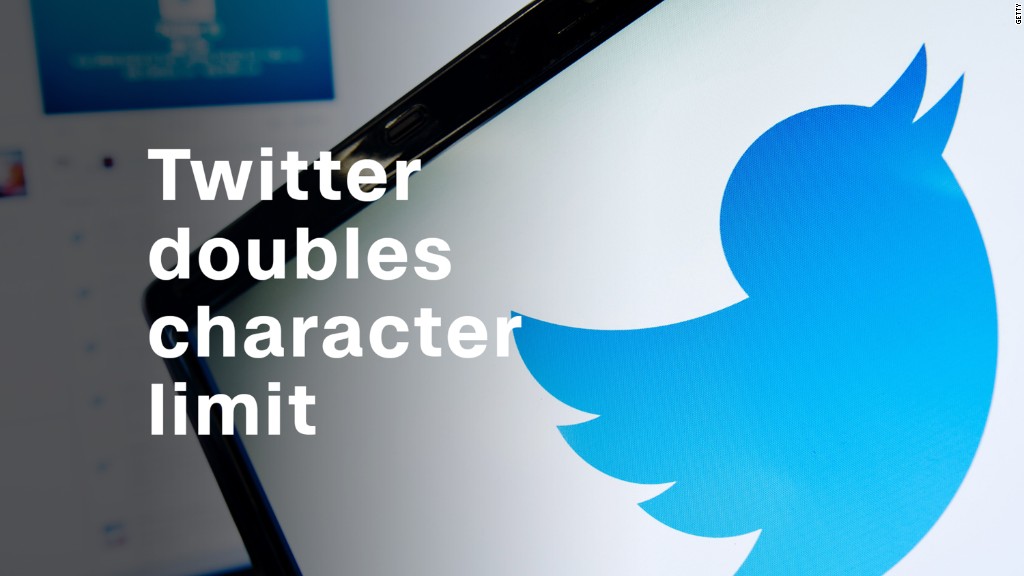
Twitter doubled the character count for some users on Tuesday. Predictably, its users freaked out.
For the first time, the social network lifted its tweet character limit from 140 to 280 among a test pool of users.
The company, which anticipated the backlash, was quick to respond. Cofounder and CEO Jack Dorsey tweeted that Twitter intends to prove the change is a positive one.
"Give us some time to learn and confirm (or challenge!) our ideas," he tweeted.
Model Chrissy Teigen expressed her frustration with the change in a series of tweets directed at Dorsey. She said she was concerned what longer tweets could mean for President Trump, a controversial tweeter. (Twitter cofounder Biz Stone later clarified Trump is not in the test group.)
Meanwhile, those selected to be a part of the experiment said they felt pressure to fill the space, wondering what to do with twice the amount of characters. Others urged Twitter to focus on fixing some of the problems it's facing, such as cutting down on harassment.
The history of limiting tweets to 140 characters stems from the founders wanting to make sure it could fit in a text message. SMS messages only allow 160 characters. Twitter decided 140 characters would be the allotment for a tweet, and 20 characters would go toward a username.
Related: Twitter explains why it won't remove Trump's North Korea tweet
Despite push back, some believe the new limit will be good because it will give room for additional context.
"Doubling the number of characters allowed on Twitter may allow more complex ideas to be conveyed without the need to strip them down to the bare minimum," Catrinel Haught Tromp, a psychologist at Rider University, told CNN Tech.
But she added that some constraints facilitate creativity, rather than stifle it. After all, Twitter users have made the most of the tiny space, from tweeting quick-witted jokes to short stories. In fact, careers have started or blossomed thanks to Twitter. Book deals, too.
For Los Angeles-based writer and comedian Sara Benincasa, Twitter is "like a joke gym." She said it helps her keep messages brief and snappy, and it's a place to try out one-liners.
But she's not against the change, she told CNN Tech.
"Maybe the new character limit will help add more context to thoughts," said Benincasa, noting how the updated count may change the way people thread their tweets.
"Threading" references the replies you can make to your own tweet to keep a single conversation together in one place. People thread multiple tweets because they run out of room in one.
Related: Twitter isn't giving Trump longer tweets, yet
"Some people don't realize one single tweet is actually part of a longer thread, so the meaning and context can be lost," Benincasa added.
But best-selling science fiction writer William Gibson, author of Neuromancer," isn't keen on the move.
"Brevity's been the soul of Twitter, for me," he tweeted on Tuesday. "The 140-character limit has been a masterclass in concision and economy."
The sentiment echoes what many users think about the change: The restrictions makes us better writers.
Haught Tromp says that's true. It can be intellectually challenging but creatively stimulating to fit words in a confined space.
"An endless field of possibilities makes choice difficult," she said. "So, imposing constraints, even arbitrary ones -- such as incorporating certain words, starting a sentence with a certain letter of the alphabet or limiting the number of words, as in the case of Twitter -- can help."
The experiment is only being conducted in certain languages, such as English and Spanish. Twitter said that cramming thoughts to fit its character count is harder for some languages. Tweets sent in Japanese use 140 characters just 0.4% of the time. English-language tweets hit 140 characters 9% of the time.
The character update could also have an impact on the word "the."
According to internet linguist Gretchen McCulloch, the most commonly used word in any large body of English text is "the." But on Twitter, it ranks number four.
"One reason for this is that people delete 'the' when trying to fit into the character limit," she said. "So we might expect that a longer character limit would make tweets more like a typical corpus of English."

